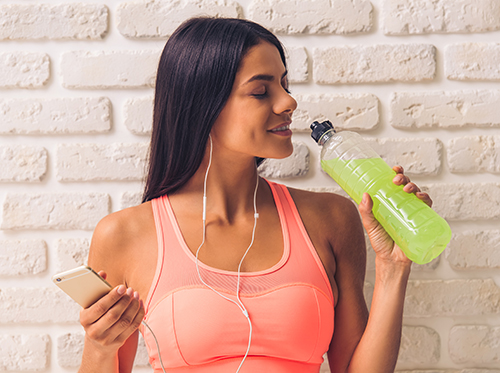What is biofilm?
October 2nd, 2018

Biofilm, the protective housing for bacteria, is a hot topic in the medical and dental fields. Routinely taking an antibiotic for a bacterial infection has become more complicated because of biofilm. Bacterial infections may become resistant to antibiotics in part because the biofilm allows for communication among the bacteria, allowing the infection to be sustained.
You’re probably wondering, Drs. Angela Paros, Amer Atassi, Eric Young, Alexander Katsnelson , what does this have to do with teeth? Since we’re dental professionals, we can tell you why it’s important and what you should know! There is biofilm in your mouth; healthy biofilm and diseased biofilm. Both are made of the same general compounds, but when combined with certain amino acids and cellular chemicals, the diseased biofilm conquers and destroys.
Periodontal disease, otherwise known as gum disease or pyorrhea, is a biofilm disease. If you are undergoing treatment for gum disease and you do not continue with the treatment plan the disease will progress and/or spread due to the biofilm.
There are several ways to treat diseased biofilm. But remember, antibiotics cannot touch the bacterial infection if the biofilm is established.
When your exam is complete, the Ultrasonic or Piezo Scaler should be used. This method of spraying water disturbs the biofilm and provides an opportunity to treat the infection causing bacteria.
Remember, we all need healthy biofilm. Just as your skin protects your body, biofilm housing good bacteria protects your body. The bacteria in the biofilm replicate every twenty minutes. If your body has healthy bacteria, low levels of hydrogen peroxide are produced by the biofilm, preventing harmful bacteria from residing. Harmful bacteria do not like oxygen.
At your exam, we will take measurements around your teeth checking for “pockets”. The higher the number, the deeper the pocket giving more room for harmful bacteria where there is no oxygen. Ask what your numbers are and be involved in restoring your healthy biofilm.
Periodontics and Pregnancy
September 25th, 2018

Periodontal health — which refers to the condition of the structures that support your teeth — is an important part of your oral and overall health. However, periodontal health becomes even more important when you're pregnant. Bad oral health can have detrimental effects on the health of your unborn child and can lead to low-birth weight babies and giving birth to a pre-term baby, according to reports by the American Academy of Periodontology (AAP), the European Federation of Periodontology (EFP), and several research studies.
Periodontal disease (gum disease) is a set of chronic, bacteria-induced, inflammatory diseases that attack the gum tissue and in more severe cases, the bones supporting the teeth. Early signs of periodontal disease usually include tenderness, swelling, and redness. Symptoms can also include bleeding gums when flossing or brushing, receding gums, loose teeth, and bad breath. These signs shouldn't be ignored, especially if you're pregnant.
Prevention is the best tool you have to fight periodontal disease. Here are some steps you can take to keep your gums in tiptop shape:
- Brush your teeth properly twice a day – angle your toothbrush at the gum line to help disrupt the bacterial growth that eventually leads to periodontal disease, and make sure you don't brush too hard.
- Floss daily and clean behind the back molars on the top and bottom of your mouth.
- Use antiseptic mouthwash to rid your mouth of the bacteria that can cause gum disease.
- Get regular checkups at our Romeoville, IL office to ensure you have no signs of periodontal disease and that your oral hygiene habits are effective.
Drs. Angela Paros, Amer Atassi, Eric Young, Alexander Katsnelson and our team urge women to care for their periodontal health during pregnancy to avoid complications. If you have any questions regarding periodontal health and how it affects you and your baby's overall health, please contact our Romeoville, IL office for more information.
The Consequences of Sports and Energy Drinks
September 18th, 2018

They’re refreshing and tasty. They’re easy to find and pretty cheap. They help us get through a long day or a long workout. They’re everywhere.
We know it’s hard to say no to an energy or sports drink. That’s why Drs. Angela Paros, Amer Atassi, Eric Young, Alexander Katsnelson and our team want to make sure you know the effects that energy and sports drinks can have on your smile and overall oral health. You might just think twice next time you crave one.
There’s a common misconception that sports and energy drinks are somehow healthier than soda beverages. None is particularly good for you, but because sports and energy drinks have higher acidity levels, they put you on a fast track to enamel erosion, which can lead to cavities over time. However, studies show that energy drinks may be the worst of the bunch.
In a study published in General Dentistry, the energy drinks that showed the highest acidity levels were 5-hour Energy, Monster, Rockstar, and Red Bull Sugar free. These drinks almost doubled in acidity when compared to sports drinks. The sports drinks that came in second as far as acidity levels go were Powerade, Gatorade, and Propel.
You may be thinking, “What's the big deal; lots of other drinks damage your teeth, too,” and you’re right. Even all-natural beverages like orange juice and other fruit juices, which are advertised as full of vitamins, contain acid that damages tooth enamel. The point here is that moderation is key.
We certainly encourage you to choose a glass of orange juice over an energy drink, but if you feel like you just can’t give up your sports and energy drink habit, then please consider the following tips:
- Limit yourself to a certain number of said beverages a week and stick to it.
- Rinse with water after consuming an energy or sports drink.
- Brush your teeth after an hour of downing the drink, so your mouth has time to return to its normal pH level.
If you have any questions, don’t hesitate to give us a call at our Romeoville, IL office. Shoot us a message on Facebook, or let us know on your next visit!
What exactly is periodontal disease?
September 11th, 2018

Periodontal disease is an infection of the tissues that surround and support your teeth. Our team at High Point Dental Group wants you to know that this common ailment can be fixed with little worry if treated properly.
Periodontal disease is usually identified through dental X-rays, probe depths, and visual exams. If left untreated, it can lead to tooth sensitivity, premature tooth loss, or discomfort and pain in your mouth. Some common symptoms to watch for include bleeding or swollen gums, bad breath, teeth movement, or jaw displacement.
Factors that may increase your risk of developing periodontal disease may include poor oral hygiene, smoking/chewing tobacco, genetics, stress, inadequate nutrition, pregnancy, diabetes, and some medications. Some of these causes are avoidable, but others are not.
If you have diabetes, you may be more prone to periodontal disease due to the greater difficulty in controlling blood glucose levels. Studies have shown that once periodontal disease is treated, glucose levels become more responsive to control as well. If your risk for periodontal disease is heightened by one of these factors, make sure to watch for the signs and keep up with your daily oral hygiene routine.
How can you treat this common disease that affects almost half of the population? Depending on the severity, treatment can include a medicated mouth rinse, antibiotic treatment, laser therapy, or scaling and root planing. It’s useful to recall that this condition can vary from mild to severe, which is why you should make an appointment at our Romeoville, IL office if you notice any of the above symptoms.






